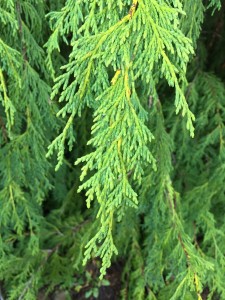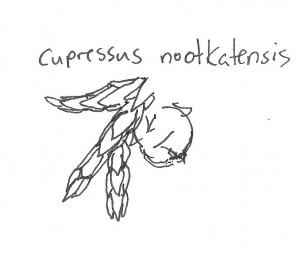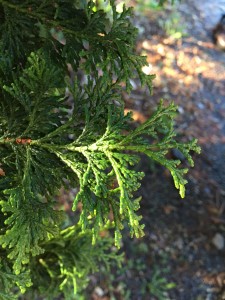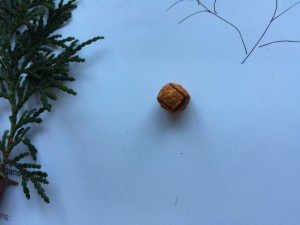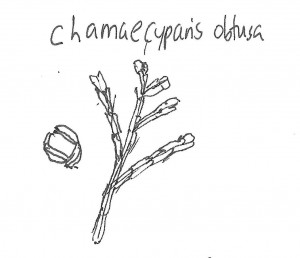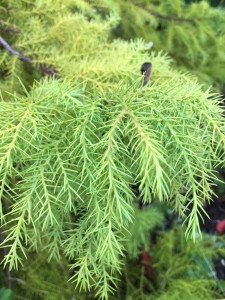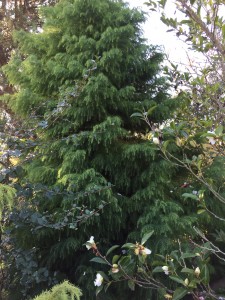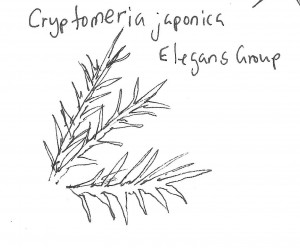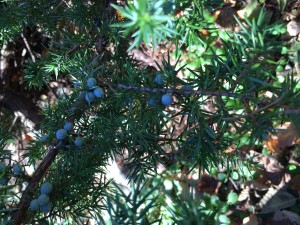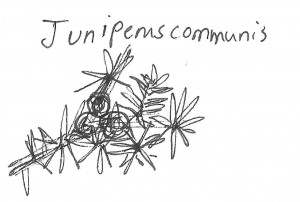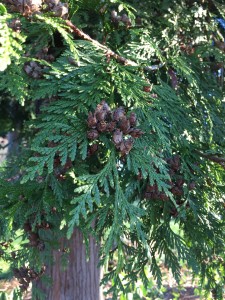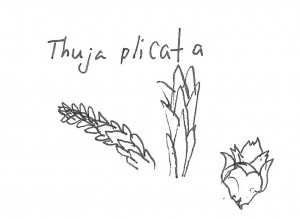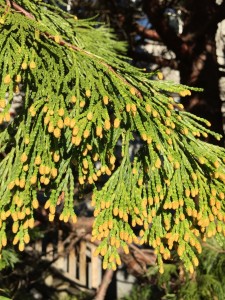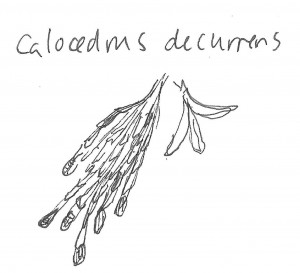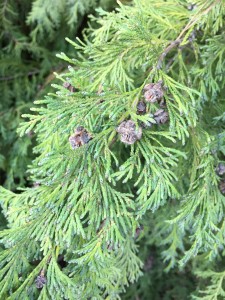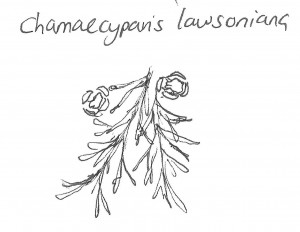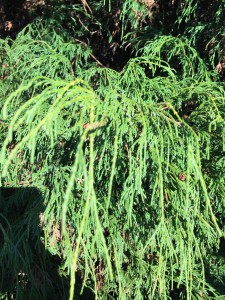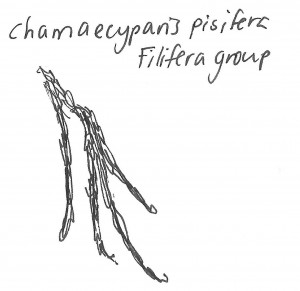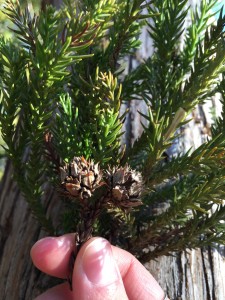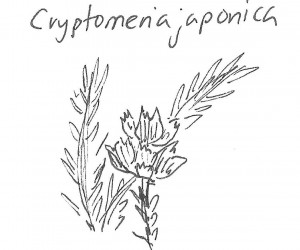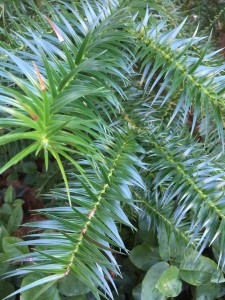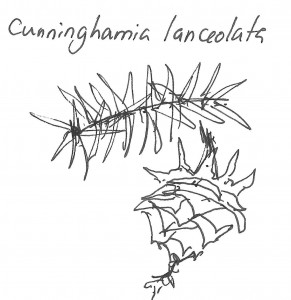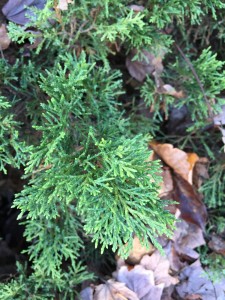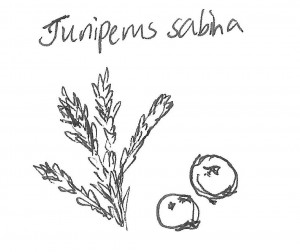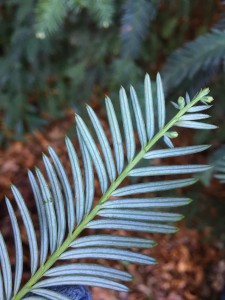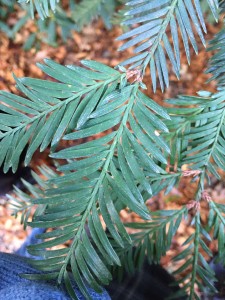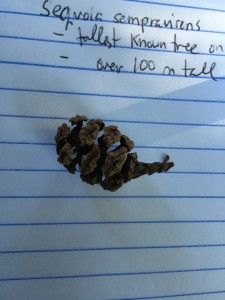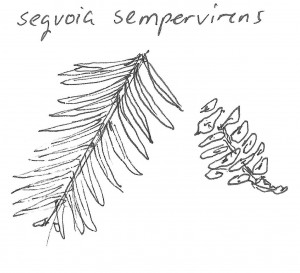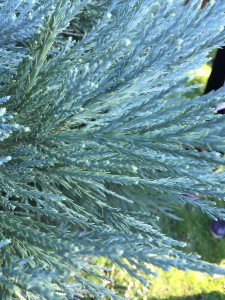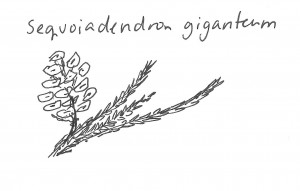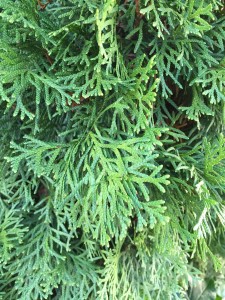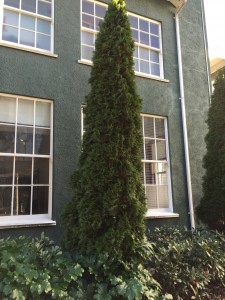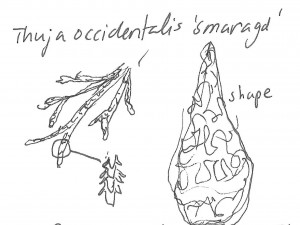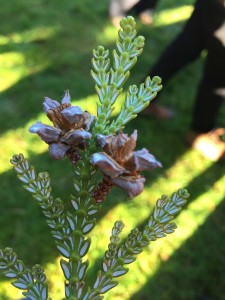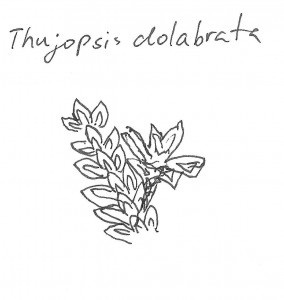Cupressus nootkatensis
Common name: yellow cedar
Useful cultivars and selections: –
USDA hardiness zone: 5
Mature height and spread: 8-15m tall by 5-10 m wide
Form: broad and pyramidal
Water use: high
Soil requirements: moist, acidic, deep
Leaf arrangement:
Fall colour: evergreen
Flower/cone/fruit descriptions: cones have pointed umbos, small, greyish
Limitations:
Suitable uses: specimen, in group, screen, many cultivars
ID description: overlapping scales, flat pendulous branches, dark green colour
Chamaecyparis obtusa
Common name: Hinoki cypress
Useful cultivars and selections: ‘Nana Gracilis’ -shrub, ‘Gracilis’- tree
USDA hardiness zone: 4
Mature height and spread: 5-8 m tall by 4-7 m wide
Form: dense, conical to columnar
Water use:
Soil requirements: organic matter rich, well drained, moist
Leaf arrangement:
Fall colour: evergreen
Flower/cone/fruit descriptions: small, round cones, look like volley balls
Limitations: cannot tolerate saturated soils
Suitable uses: some cultivars suitable size for residential areas
ID description: Scalloped bracelets – curl and fold back on themselves, has a sculptural quality, tips of leaf (scale) is blunt and rounded
Cryptomeria japonica Elegans group
Common name: sugi
Useful cultivars and selections: –
USDA hardiness zone: 6
Mature height and spread: 6-10 m tall by 4-6 m wide
Form: branches sweep up at the ends, conical to cylindrical
Water use: high
Soil requirements: moist, well drained
Leaf arrangement:
Fall colour: evergreen
Flower/cone/fruit descriptions: small cones, have about 3 teeth on each scale
Limitations: cannot handle drying winds or poor drainage
Suitable uses: can be planted in large containers, some cultivars are residential size
ID description: rubbery foliage, soft looking, has juvenile foliage, yellow to green to purple colour
Juniperus communis
Common name: common juniper
Useful cultivars and selections: –
USDA hardiness zone: 2
Mature height and spread: 1-1.5 m tall by 2-4 m wide
Form: shrubby, can be conical, prostrate
Water use:
Soil requirements: acidic, well-drained,
Leaf arrangement:
Fall colour: evergreen
Flower/cone/fruit descriptions: “berries”- cones with fused scales- don’t ever open (must be chewed on by animals to get the seed out)
Limitations: cannot be in full shade or cold, wet conditions
Suitable uses: hedge or barrier
ID description: awl shaped needles, can be straight or pointed, but typically curved, smells like gin
Thuja plicata
Common name: western red cedar
Useful cultivars and selections: –
USDA hardiness zone: 5
Mature height and spread: 10-20 m tall by 8-12 m wide
Form: cone shaped, branches horizontally
Water use: high until established
Soil requirements: moist, fertile, acidic
Leaf arrangement:
Fall colour: evergreen
Flower/cone/fruit descriptions: Cones have small hook on tip of scale (umbo), cone scales are opposite and decussate
Limitations: not tolerant of winds or extreme temperatures
Suitable uses: used extensively by First Nations people, specimen
ID description: scales are glossy green, base of scale is decurrent, needles scales overlap, smells sweet
Calocedrus decurrens
Common name: incense cedar
Useful cultivars and selections: –
USDA hardiness zone: 6
Mature height and spread: 8-15 m tall by 2-4 m wide
Form: cone shaped to columnar
Water use: medium
Soil requirements: well-drained,
Leaf arrangement:
Fall colour: evergreen
Flower/cone/fruit descriptions: male pollen cones yellow, little balls at ends of branchlets, female cones small, look like duck bills when they open
Limitations: needs full sun
Suitable uses: specimen, accent
ID description: scales bright green, overlapping, fan-like, flat branches
Chamaecyparis lawsoniana
Common name: Lawson cypress
Useful cultivars and selections: –
USDA hardiness zone: 5
Mature height and spread: 8-15 m tall by 4-7 m wide
Form: conical to columnar
Water use: medium
Soil requirements: well-drained, moist, OM rich
Leaf arrangement:
Fall colour: evergreen
Flower/cone/fruit descriptions: small round cones, little pointed umbos, male cones are red- see them around Christmas
Limitations: needs a lot of room, susceptible to disease cypress root rot (can be grafted onto Thuja smarag to survive disease)
Suitable uses: residential areas
ID description: scales dark green to blue, overlapping, red pollen cones at the ends of branchlets in the winter
Chamaecyparis pisifera Filifera Group
Common name: thread leaf cypress
Useful cultivars and selections: –
USDA hardiness zone: 5
Mature height and spread: 6-10 m tall by 4-7 m wide
Form: conical to columnar, branches with pendulous tips
Water use: medium
Soil requirements: well-drained, moist, OM rich
Leaf arrangement:
Fall colour: evergreen
Flower/cone/fruit descriptions: cones not normally found on cultivar, pea shaped
Limitations: cannot tolerate saturated soils
Suitable uses: smaller cultivars good for residential areas
ID description: strong smell like celery, long stringy branches
Cryptomeria japonica
Common name: sugi, Japanese cedar
Useful cultivars and selections: –
USDA hardiness zone: 6
Mature height and spread: 6-10 m tall by 4-6 m wide
Form: branches sweep up at the ends, conical to cylindrical
Water use: high
Soil requirements: moist, well drained
Leaf arrangement:
Fall colour: evergreen
Flower/cone/fruit descriptions: small cones, about 1 cm in diameter, cone scales overlap with 3 spiky prongs
Limitations: not shade tolerant
Suitable uses: can be planted in large containers, some cultivars are residential size
ID description: rubbery foliage, soft looking, needles decurrent and point forward, not fragrant, fibrous bark that shreds in vertical strings, needles stiff and pointy
Cunninghamia lanceolata
Common name: China fir
Useful cultivars and selections: –
USDA hardiness zone: 7
Mature height and spread: 6-10 m tall by 4-6 m wide
Form: conical to columnar, branches irregular, open form
Water use: high
Soil requirements: moist, well drained
Leaf arrangement: spirally arranged
Fall colour: evergreen
Flower/cone/fruit descriptions: Cone is very anomalous in family – not actually true cones, many triangular bracts, overlapping, light brown, globose,
Limitations: cannot tolerate dryness, cold, winds
Suitable uses: sustainable lumber (can be cut down and then regrow), specimen, slab or container
ID description: needles broad, waxy, dark green to blue, flattened
Juniperus sabina
Common name: savin juniper
Useful cultivars and selections: –
USDA hardiness zone: 3
Mature height and spread: 4-6 m tall by 5-10 m wide
Form: shrub, finely branched
Water use: medium
Soil requirements: acidic, well-drained,
Leaf arrangement:
Fall colour: evergreen
Flower/cone/fruit descriptions: “berries”- cones with fused scales- don’t ever open (must be chewed on by animals to get the seed out)
Limitations: cannot be in full shade or cold, wet conditions
Suitable uses: hedge or barrier
ID description: awl shaped needles, can be straight or pointed, but typically curved, very strong smell, not always pleasant, branched more finely than communis
Sequoia sempervirens
Common name: redwood
Useful cultivars and selections: –
USDA hardiness zone: 7
Mature height and spread: can grow over 100 m tall
Form: strong lateral branching
Water use:
Soil requirements: deep, moist, well drained
Leaf arrangement: spirally arranged
Fall colour: evergreen
Flower/cone/fruit descriptions: cones 4 cm tall, reddish brown, oblong
Limitations: cannot tolerate cold, drying winds
Suitable uses: specimen, in groups
ID description: sheds branchletts, can be confused with taxus- (taxus- branchletts are not deciduous), branchlets like like a feather- needles get smaller towards tip, decurrent, distichous (2 ranked)
Sequoiadendron giganteum
Common name: giant sequoia
Useful cultivars and selections: –
USDA hardiness zone: 6
Mature height and spread: up to 100 m tall
Form: narrow, conical
Water use:
Soil requirements: shallow soil- short and fat, deep soil-tall, evenly moist, well drained
Leaf arrangement:
Fall colour: evergreen
Flower/cone/fruit descriptions: cones twice the size of sempervirens, fire adapted, typically release seeds when heated
Limitations: not tolerant of urban conditions, cold winds
Suitable uses: specimen or in group
ID description: decurrent scale like leaves, distinctive smoky smell
Thuja occidentalis ‘Smaragd’
Common name: emerald cedar
Useful cultivars and selections: –
USDA hardiness zone: 2
Mature height and spread: 8 m tall by 2 m wide
Form: conical, tight and narrow
Water use: needs water, especially when planted
Soil requirements: fertile, moist, acidic
Leaf arrangement:
Fall colour: evergreen
Flower/cone/fruit descriptions: oval cones, small, smooth scales, imbricate
Limitations: cannot tolerate poor drainage, need water when esablishing
Suitable uses: hedge, screen, in rows, thin planting strips, cheap hedging option
ID description: fine texture, decurrent scale needles, grass green colour
Thujopsis dolobrata
Common name: lizard tree
Useful cultivars and selections: –
USDA hardiness zone: 6
Mature height and spread: 8-15 m tall by 6-10 m wide
Form: forms colonies, upright multiple stems, branches horizontally
Water use:
Soil requirements: moist, fertile, acidic
Leaf arrangement:
Fall colour: evergreen
Flower/cone/fruit descriptions: cones small, imbricate, wax covered scales
Limitations:
Suitable uses: specimen or in group
ID description: beautiful white wax pattern on backs of branches, dark green, shiny scales
